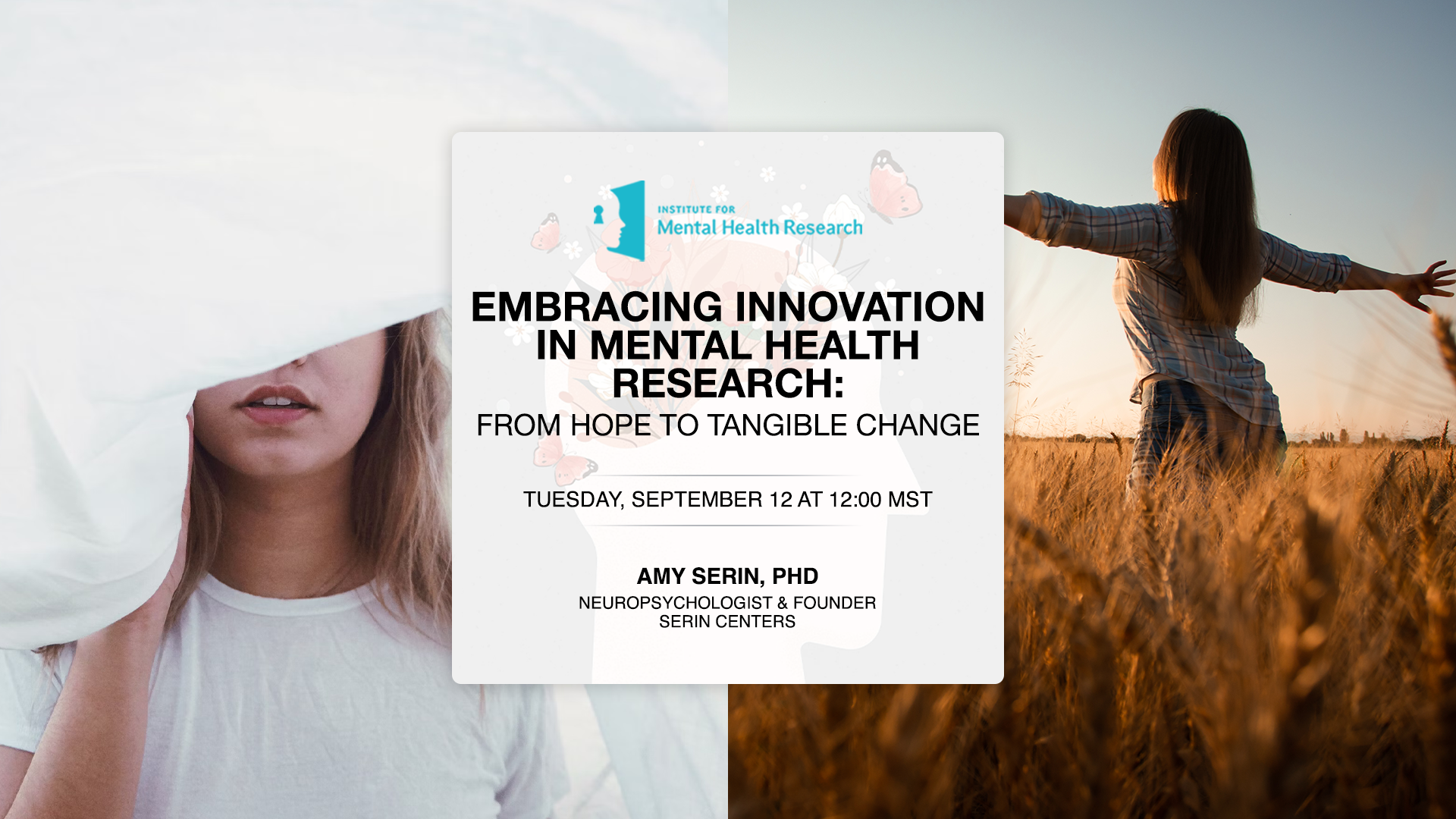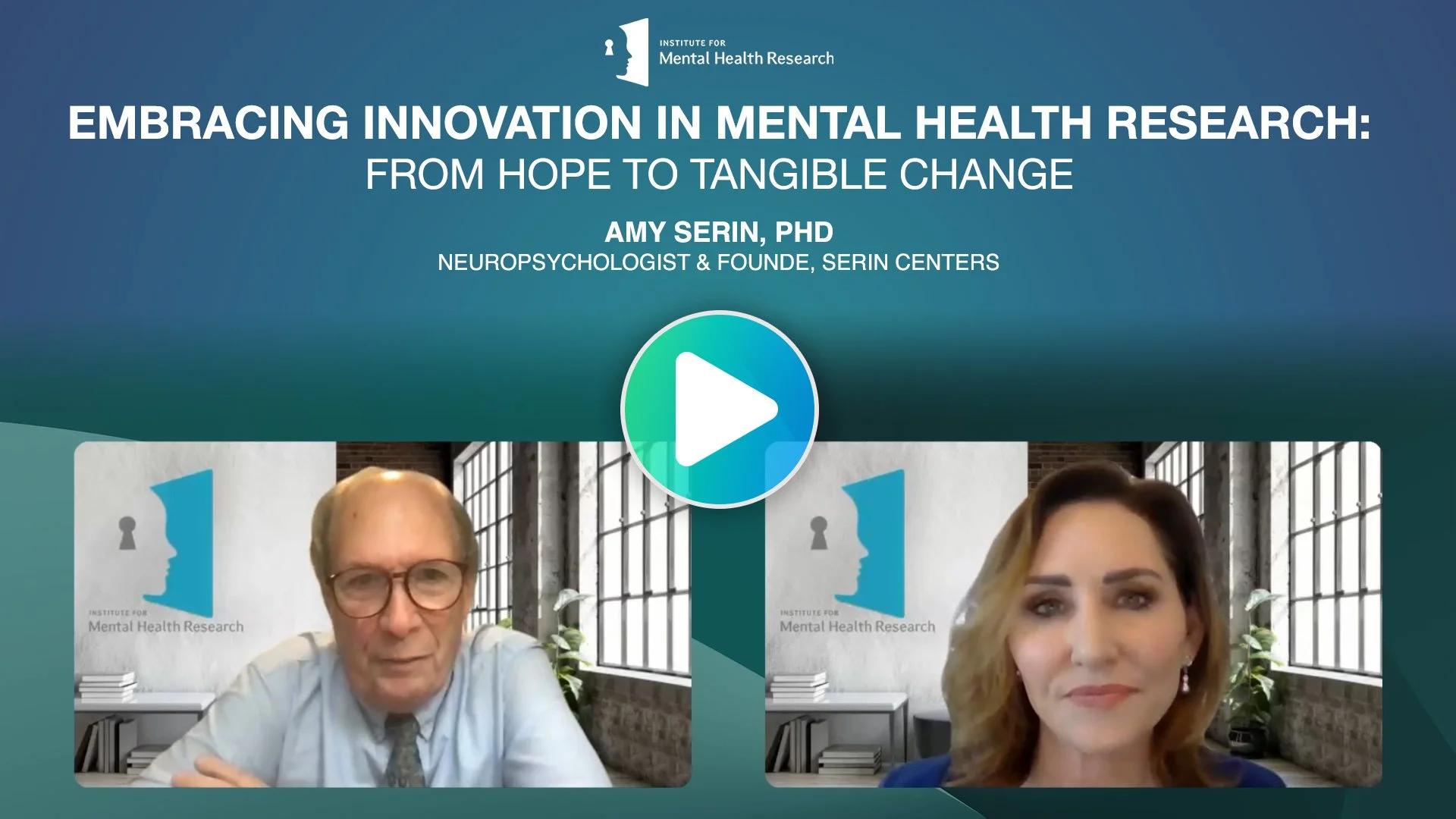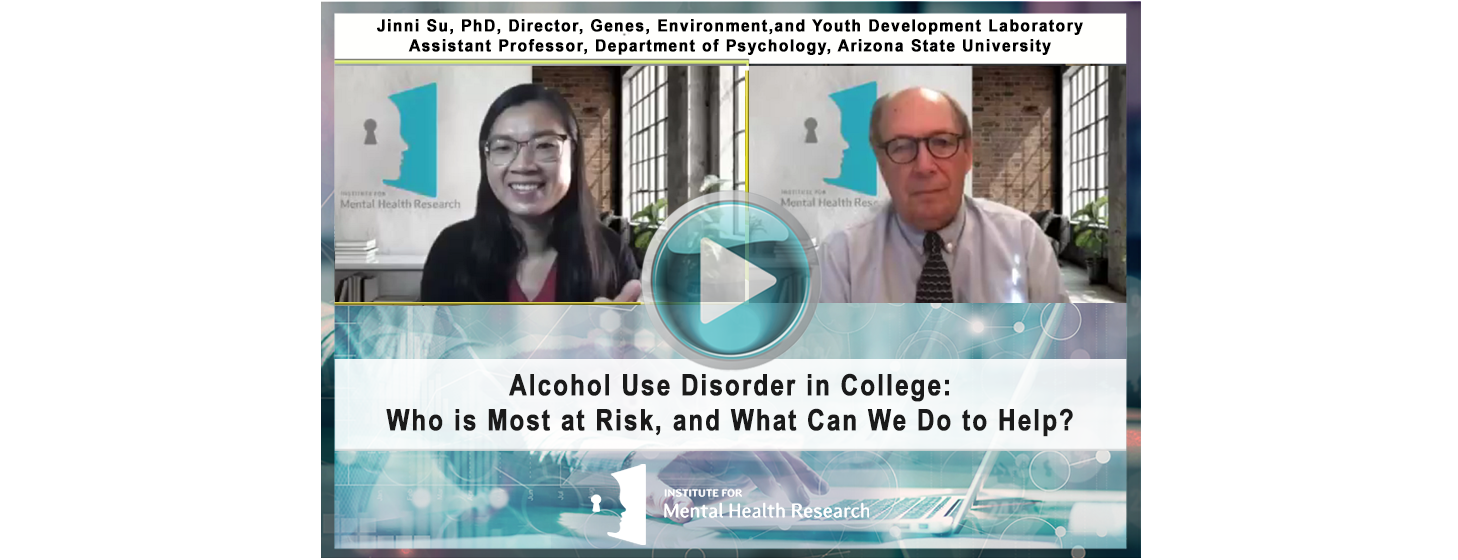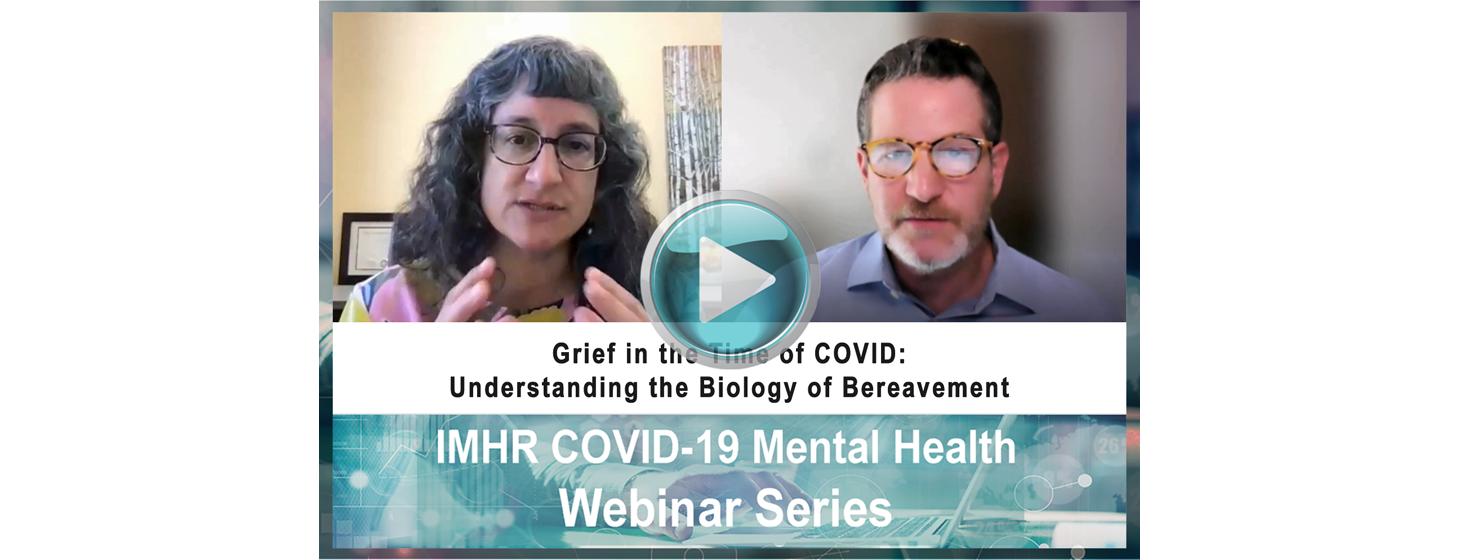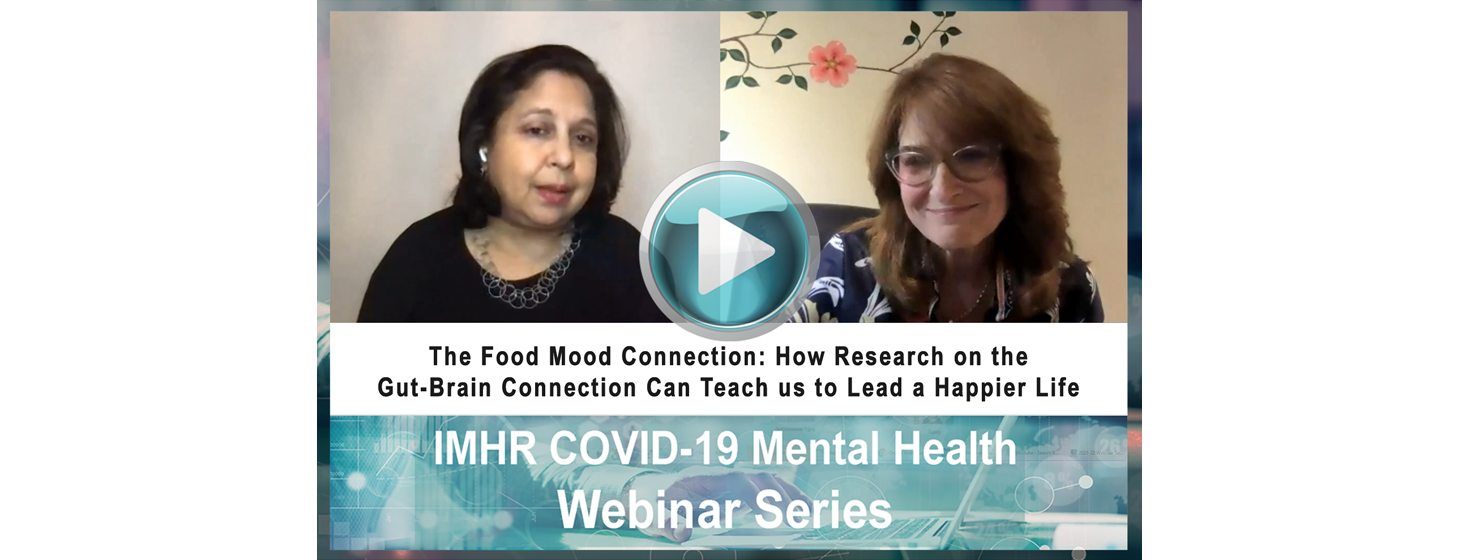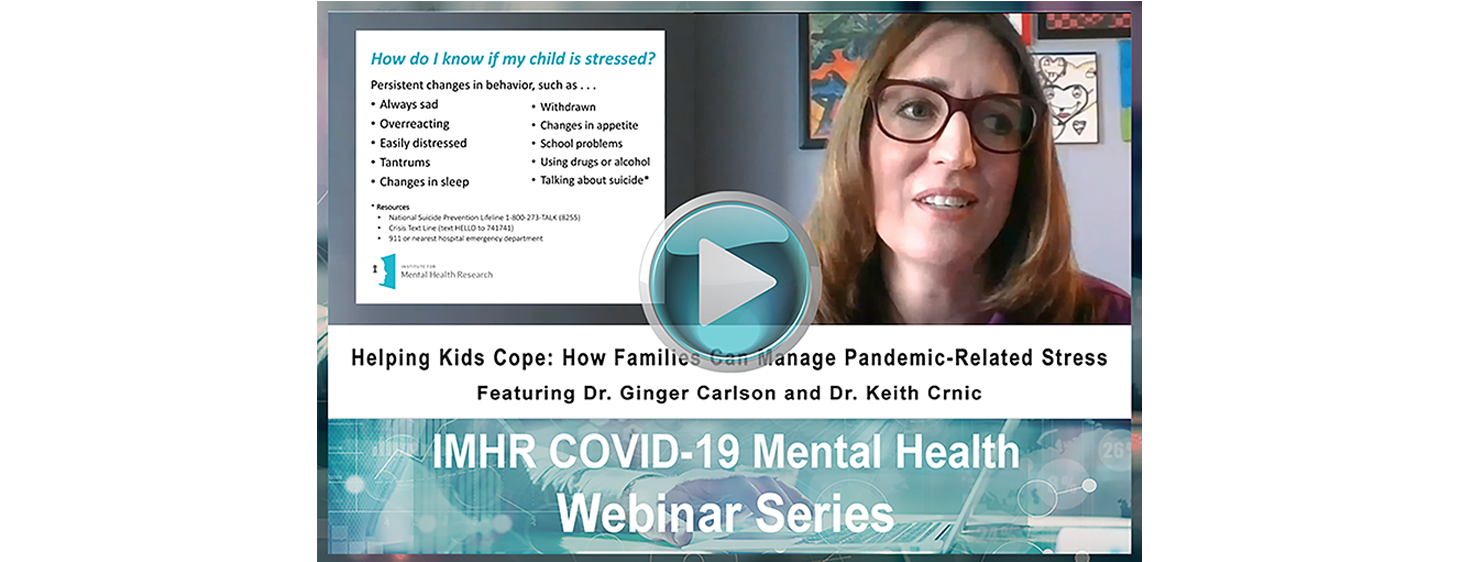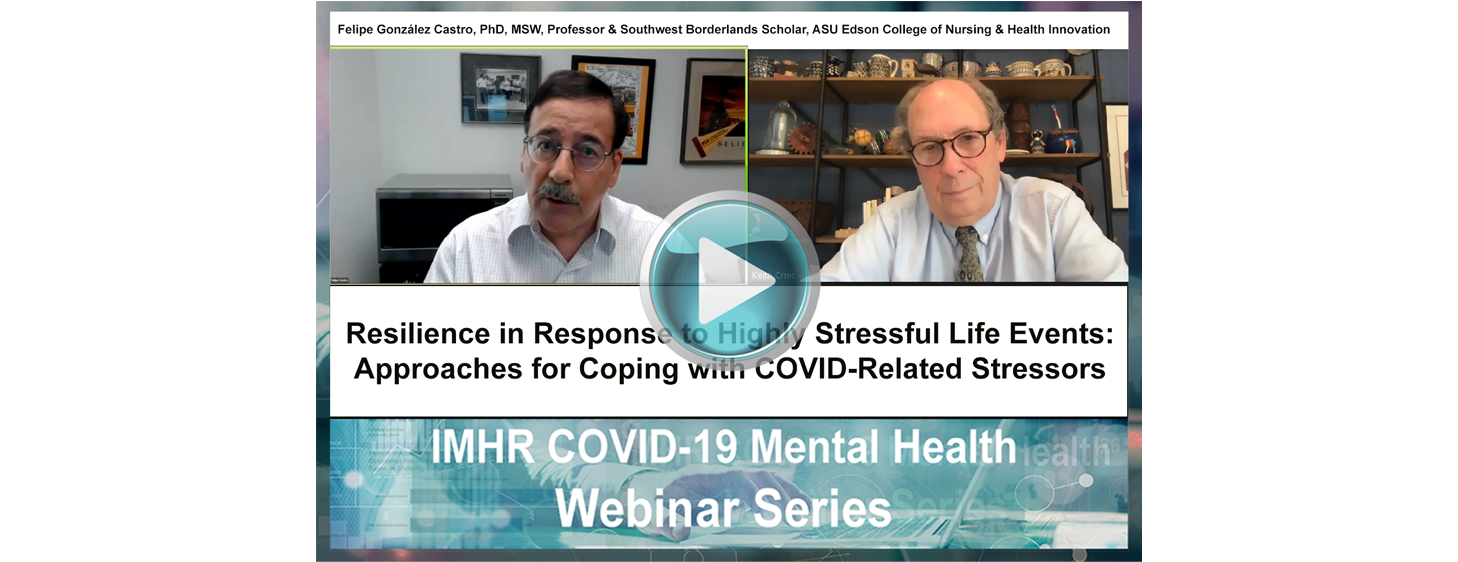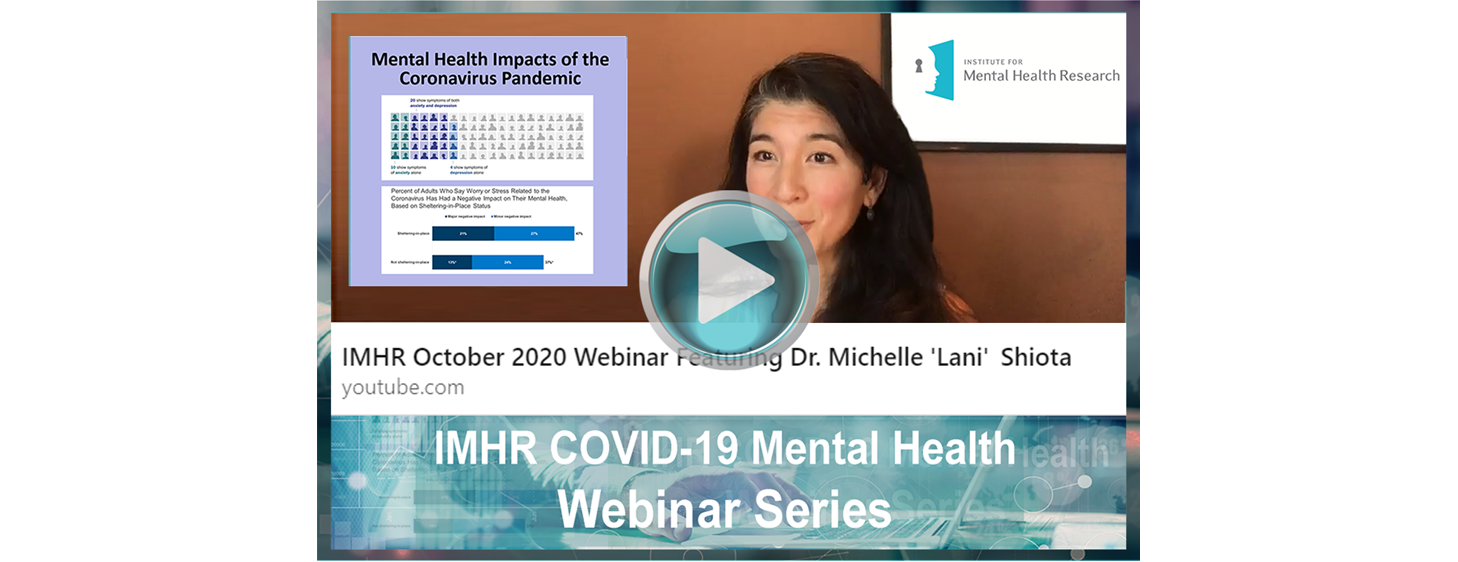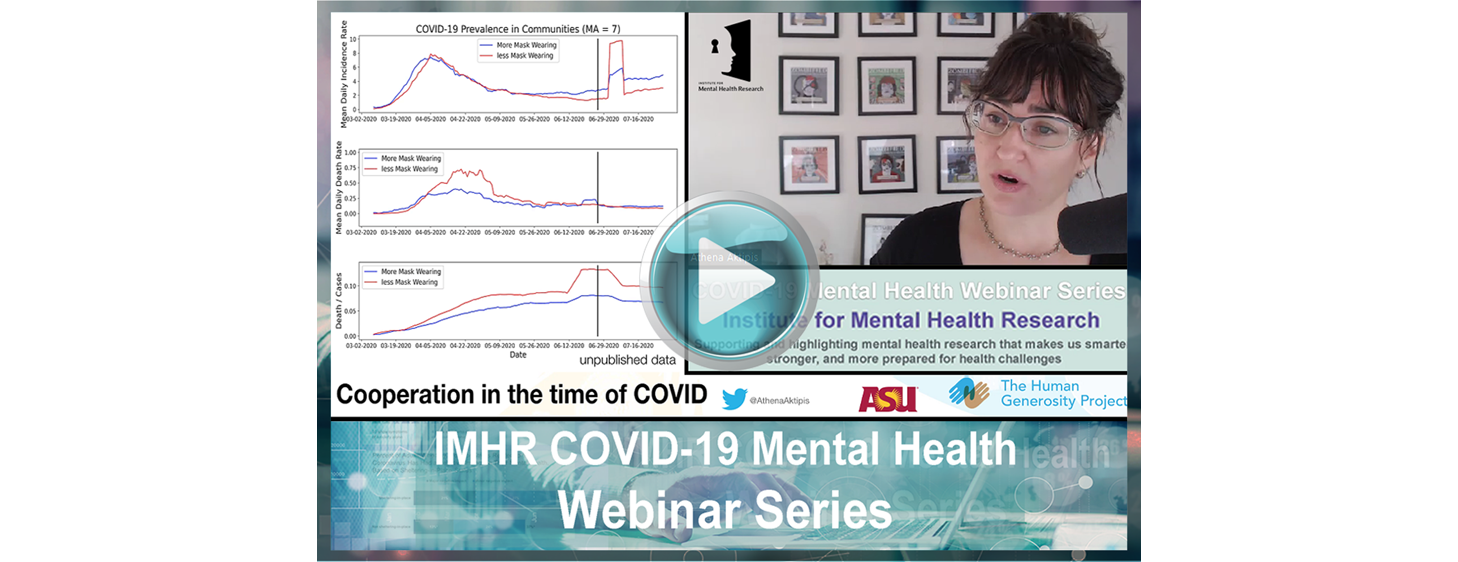
Institute for Mental Health Research
Events and Webinar Series
IMHR WEBINAR SERIES
The Institute for Mental Health Research is pleased to present our webinar series as a complimentary, educational resource for our community.
Each webinar features researchers and experts addressing mental health topics with impact on diverse communities.
Broadcast attendees have the opportunity to ask questions in real time.
The 2023 webinar series is now available for viewing on our Vimeo Channel.
Please follow this page to discover dates for our 2024 webinar series.
We look forward to sharing our latest research with you!
What are the demographics of violence in the United States where mental illness is also a factor? How does this align with our beliefs about violence and the mentally ill? Dr. Mehul Mankad, Chief Medical Officer of NovumHealth & Adjunct Assistant Professor at Duke University’s Department of Psychiatry is sharing research into mental illness and violence along with some surprising findings.
The Institute for Mental Health Research, #IMHR-az invites you to examine our collective social ideas about #violence and the #mentally ill. What are the #stereotypes? Does the research support those conclusions? Dr. Mankad will present a frank and honest discussion about what the #research shows us.
Dr. Mehul Mankad is Chief Medical Officer of NovumHealth, a behavioral health company serving individuals in Arizona, Nevada, and California. He is also an Adjunct Assistant Professor in the Department of Psychiatry and Behavioral Sciences at Duke University in Durham, North Carolina.
Prior to his current role at NovumHealth, Dr. Mankad has held a variety of leadership positions including Chief Medical Officer of a managed behavioral health organization, chief of psychiatry at the Durham Veterans Affairs Medical Center, and Director of the Center for Psychiatry and Law at Duke University.
Dr. Mankad twice received Teacher of the Year from the Duke Department of Psychiatry and has published in the scientific literature. Dr. Mankad pursued his undergraduate and medical education at Northwestern University. Subsequently he completed his residency at Duke University and his forensic psychiatry training at Rush University. He is board certified in psychiatry and forensic psychiatry.
Half of all children diagnosed with ADHD have at least one parent with the disorder but most strategies designed for helping those children neglect to take parents’ struggles with ADHD or executive dysfunction into account. Dr. Lauren Friedman and her colleagues at Arizona State University’s Department of Psychology are studying ways to effectively and practically support parents with ADHD so they can, in turn, support their kids.
The Institute for Mental Health Research, #IMHR-az invites you to a groundbreaking webinar that delves into the intricate relationship between ADHD in parents and children. Statistics show us that:There are more than 6 million children in the US diagnosed with ADHD. Half of all children with ADHD have at least one parent with the disorder.When parents seek treatment for their kids but struggle to engage with treatment due to their own ADHD challenges, treatments are less effective.Newer treatment options that address ADHD in the whole family are needed, yet no such treatment exists.
Join our special guest Dr. Lauren Friedman, principal researcher of “Behavioral Parent Training for Childhood ADHD: How Does ADHD in Parents Affect Treatment for Children?” to explore the latest research findings, clinical insights, and potential avenues for intervention.
Dr. Lauren Friedman is an Assistant Professor within the Department of Psychology at ASU, director of the Hyperactivity, Executive function, and Attention Treatment (HEAT) Program, and holds a concurrent appointment at the Research and Education Advancing Children’s Health (REACH) Institute. Dr. Friedman received her Ph.D. in Clinical Psychology from the University of Central Florida. She completed her clinical internship and post-doctoral fellowships at the University of California, San Francisco. Her research centers on understanding the etiology of childhood ADHD to inform interventions for the disorder. She examines the cognitive processes contributing to the core symptoms and functional deficits associated with ADHD, and the impact on parental ADHD on treatment response. She uses this knowledge to optimize behavioral interventions for youth with ADHD using novel treatment adaptations and approaches.
Are you ever frustrated that mental health treatments seem to have evolved so little beyond antidepressants and Cognitive Behavioral Therapy? While innovations are being made year over year in other medical fields, mental health professionals are stuck with innovations last made in the 1980s. And people continue to suffer.
In this free webinar, IMHR is calling all professionals and lay people passionate about mental health who want to create change and bring research Out of the Academy & Into Our Hands.We know that doctors and practitioners on the front lines of mental health treatment are often constrained by slow-to-publish, tradition-focused research. What good is research if we don’t do anything with it? We'll explore how innovative, non-invasive treatments are being overlooked and deemed "risky," and discuss how we can bridge the gap between academic research and the independent marketplace to offer better, more effective solutions.We believe that mental health is just as important as physical health, and it's time to dispel the notion that technological innovations don't belong in this field. We'll explore how cutting-edge advancements in technology can #revolutionize and #democratize mental health research and improve treatment outcomes.We are energized to be part of the public groundswell in support of change-making legislation to support innovation in care. #Discuss with us how to vote in policy-makers for positive change.
Dr. Amy Serin is an internationally recognized neuropsychologist and stress expert on a mission to help you live your best life! After graduating from Arizona State University in 1996 as Valedictorian (Moeur Award), she obtained her Ph.D. in Clinical Psychology from Fielding Graduate University in 2006. She then founded Serin Centers in 2007 to integrate cutting-edge, results-oriented neuropsychology into profound and permanent results for her clients. Her unique blend of scientifically based methods for anxiety, depression, ADHD, learning disabilities, traumatic brain injuries, autism spectrum disorders, giftedness, performance enhancement, and life challenges are "truly revolutionary" according to Huffington Post. Since 2007 Serin Centers have helped thousands of kids, teens, and adults reach their full potential.
Her book The Stress Switch: The Truth About Stress and How to Short Circuit It reached #1 best-seller status for Preventative Medicine on Amazon in 2019. She is the recipient of several international awards for inventing TouchPoints neuroscience stress wearables, including the 2018 Gold Edison Award for Health and Wellness, Forbes 2019 Best Technology Award for Health and Wellness, and Digital Trends 2019 Best of CES award. Dr. Serin is a sought-after keynote speaker for conferences, including the International Society for Neurofeedback and Research, EMDR International Association, and Entrepreneur's Organization. She has been featured in USA Today, Huffington Post, Inc., NBC, Thrive Global, Men's Health, Shape, Mashable, and Bustle, among others.
Dr. Serin is an Arizona native who is passionate about health and wellness. In her spare time, she enjoys all things active, spending time with her two teenage sons and boyfriend, and unsuccessfully trying to get her mini-Goldendoodle to stop terrorizing passers-by when on walks.
AUGUST 2023
The perils of the mind after midnight: binge eating, texting your ex, watching *just one more* episode of Friends and then suddenly, the alarm clock is sounding and you’re filled with #regrets. Why did I eat an entire pint of ice cream? Why did I stay up watching a show I’ve seen a million times? Oof, why did I send those texts to my ex?
Science has the answers!
Dr. Michael Grandner’s groundbreaking research, funded in part by IMHR, delves into the connections between sleep and the brain. The study has revealed some answers about why we make such poor decisions at night when we should be sleeping and the far reaching and sometimes devastating consequences of those 2 AM choices to our overall health and wellbeing.After midnight the brain has increased reward seeking behavior but a decrease in reward processing ability. We’ll discuss the implications and potential consequences.Learn how inadequate sleep can contribute to anxiety, depression, and other mental health disorders. Discover proven strategies to improve your sleep quality.Explore the impact of sleep on your heart & your weight. Uncover the vital role proper sleep plays in maintaining a healthy cardiovascular system and diabetes prevention.
Dr. Grandner is the principal investigator for the ongoing research project titled: “The Mind After Midnight”.
Dr. Grandner is the Director of the Sleep and Health Research Program at the University of Arizona, Director of the Behavioral Sleep Medicine Clinic at the Banner-University Medical Center, and an Associate Professor in the Department of Psychiatry at the UA College of Medicine, with joint appointments in the Departments of Medicine, Psychology (UA College of Science), Nutritional Sciences (College of Agriculture and Life Sciences), and Clinical Translational Science. In addition, he is a faculty member of the Neuroscience and Physiological Sciences Graduate Interdisciplinary Programs. He is Certified in Behavioral Sleep Medicine by the American Board of Sleep Medicine and is a Diplomate in Behavioral Sleep Medicine by the Board of Behavioral Sleep Medicine.
His research focuses on how sleep and sleep-related behaviors are related to cardiovascular disease, diabetes, obesity, neurocognitive functioning, mental health, and longevity. Current and recently-completed research projects were funded by the National Institute on Minority Health and Health Disparities (NIMHD), the National Institute on Drug Abuse (NIDA), the National Heart, Lung, and Blood Institute (NHLBI), the National Institute for Environmental Health Sciences (NIEHS), the American Heart Association (AHA), the National Collegiate Athletics Association (NCAA), and other organizations.
JUNE 2023
New research by Karey O’Hara, PhD, funded in part by IMHR, is testing intervention strategies to find those that help safeguard the mental health of children affected by separation and divorce.
In 2021, there were over 689,000 divorces in the United States. Divorce and separation is a fact of modern life and we know that in some cases, children’s mental health can suffer lasting consequences. Luckily, most children are resilient and do not go on to develop long term problems. However, a subset of children - those exposed to frequent and intense conflict between their parents - are at especially high risk for negative outcomes. What is life like for children facing high levels of interparental conflict after their parents separate or get divorced? What do children need in order to cope with conflict in the context of separation and divorce? What strategies are effective, affordable, and accessible to parents that can protect children and minimize the potentially harmful long-term effects on their mental health and well-being?
Learn about:How parents can support children in during and after separation/divorces to protect & promote their mental healthThe most critical components of programs aimed at helping children copeHow research can identify successful intervention
Karey L. O’Hara, Ph.D. is an Assistant Professor of Psychology at Arizona State University. She conducts research on risk and protective factors that influence how youth and families adjust after stressful events that involve contact with family, juvenile, or criminal court systems, such as parental divorce and parental incarceration. Currently, her research focuses on designing, optimizing, and evaluating interventions to promote the health and well-being of youth who experience these challenging stressors. Her work is currently funded by a career development award from the National Institute of Mental Health. Dr. Karey is the principal investigator for the ongoing research project titled: “What Do Children Need to Cope With Post-Separation/Divorce Interparental Conflict? Strategies to Protect and Promote Children’s Mental Health”
Our 20-year old nonprofit relies on the generosity of individuals, companies, government partners, and foundations to provide this service,and to award grants to Arizona researchers, whose bold ideas pave the way to groundbreaking advancements in mental health.
VIEW PREVIOUS IMHR WEBINARS
Click play button to view on our Vimeo channel

JOIN US AS A CATALYST FOR CHANGE
The Institute for Mental Health Research is pleased to present our webinar series as a complimentary, educational resource for our community. Each webinar features researchers and experts addressing mental health topics with impact on diverse communities. Broadcast attendees have the opportunity to ask questions in real time.
Our 20-year old nonprofit relies on the generosity of individuals, companies, government partners and foundations to provide this service, and to offer grants to Arizona mental health researchers whose bold ideas
pave the way to groundbreaking advancements.
Donate: www.imhr.org/donate




